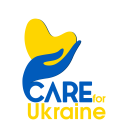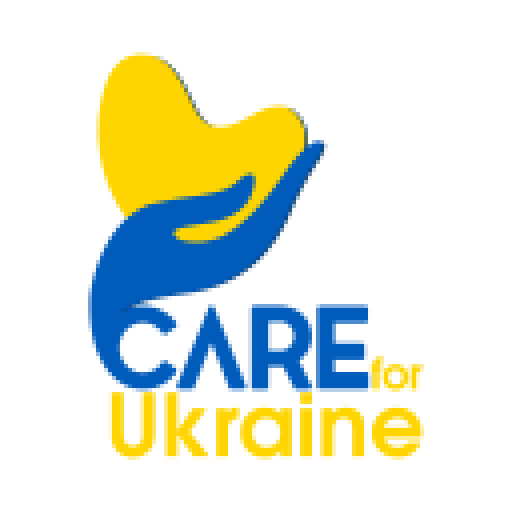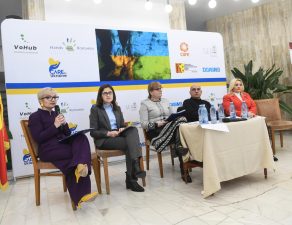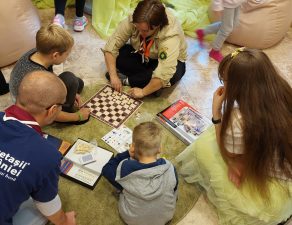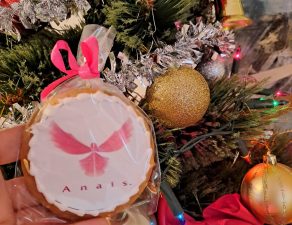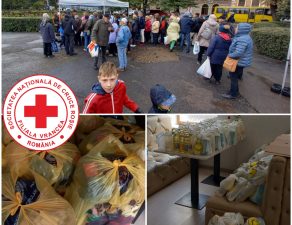
The Parada Foundation has been working with street children, youth and adults since 1996. The story of Parada began after a meeting took place between children sleeping on the streets, in sewage wells and abandoned buildings of Bucharest in the 1990s and the Franco-Algerian clown, Miloud Oukili. Armed with a red nose and a lot of friendliness, Miloud won their trust and showed them the joy of being applauded by passers-by. On this joy as the foundation he then gradually built up the hope of moving forward, even after a life lived on the fringes of society.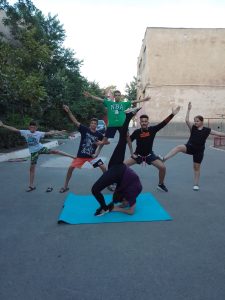
The social circus is a playful and educational tool for social integration and community development, and with its help children and youngsters discover the performing arts and, more importantly, develop self-esteem and discover teamwork.
“The Parada Foundation has suffered quite a bit during the pandemic,” says Managing Director Ionuț Șerban Jugureanu. When most of the population were staying at home, and the lucky ones could even continue with their jobs this way, two years for the homeless children and adults deepened their perilous situation and increased enormously the need for basic humanitarian assistance (food, diapers, milk powder, medicines).
“All our arrangements with the social circus have fallen through,” says Jugureanu. “We had tours and performances scheduled, all for educational purposes, but also to raise funds to keep us going. To make matters worse, as the months went by, even those who were self-sufficient ended up requiring humanitarian assistance and we had to focus our scarce resources on just that.“
The onset of the war in Ukraine in the spring of 2022 was a challenging but mobilizing moment for the Parada Foundation. “We are competent in social and humanitarian assistance and we could not remain indifferent when seeing families and children who lost their homes all of a sudden,” says Jugureanu.
After several visits to train stations, airports, bus stations and border crossings, the team decided to focus on assistance at Isaccea because, at that time, it was receiving the least amount of specialized assistance and because the people arriving to our country through this border crossing were mainly fitting the vulnerable person profile.
“Most of the people arriving in Isaccea were carrying meagre luggage, with no vehicles. They would hitchhike to the Ukrainian border, then take the ferry across to Romania and continue their journey on foot. At that time there was a single white tent, quite packed, where many had to stay overnight while waiting for a transport. There was still snow on the ground,” remembers Jugureanu.
So the Parada arrived at the border crossing bringing acrobatics, tricks and juggling staged by the social circus team. “For our team there were also moments of joy. The minibus ride, seeing the border and the Danube – it’s all an adventure. Plus, we were finally putting on shows again. Touring is always a happy experience from which I take back many memories“, explains Jugureanu.
The Parada Foundation continues working with the most vulnerable people, combining social circus with basic humanitarian assistance services, as well as education and professional insertion projects by running street interventions, a day center and an educational center.
The Parada social circus team is not a first-timer performing for other vulnerable categories. Years ago, they performed in Cambodia and often entertained children at the Fundeni Oncology Institute or at the Burn Unit of the Grigore Alexandrescu Hospital.
As the flow of refugees has stabilized, the Parada team has focused on performing and educational activities for Ukrainian children who have remained in transit centers in and around Tulcea. “Since the beginning of the war, many families have moved on to other destinations or returned back to Ukraine. But always, the most vulnerable of people with very few options stayed on in the transit centers. That’s how hundreds of them ended up living in these centers and we discovered that we could work with children permanently, as the groups were becoming less and less varied.“
For these activities, Parada hired two educators and a psychologist from Tulcea to meet their needs there.
“It appears that things have settled down because refugees are no longer arriving in such large numbers as before. For example, we don’t have an animation team at the border crossing at the moment because children are rarely seen. But we are very active in the centers around this area,” explains Jugureanu.
“There are still many things that require solutions. We bought curtains and bed linens for the boarding schools housing the refugees. We often had to take care of the food catering for as long as our resources lasted. The 20 lei per person offered by the Romanian Government could never cover the cost of three meals a day. In some areas of Romania, including Bucharest, local authorities supplement these funds. In other areas not at all. The same goes for access to education. The Romanian Government is not making enough of an effort to encourage families to enrol their children in schools and to make this process easier,” says Jugureanu.
“We don’t have to reinvent the wheel, but we need a budget for it. We can see that in other countries they have these introductory classes where students are assigned regardless of their level and language spoken, and they are designed to prepare you for enrolment for the next school year. There are still areas where we do absolutely nothing to get children into school, but leave them isolated to continue with online classes in the middle of a war, having already lived through two years of pandemic with similar solutions.”
The Parada team continues its work in Bucharest where in the future it would like to develop more programs for Ukrainian children and youth who settle here. In parallel, it offers animation, shows, entertainment, non-formal education and assistance to improve life in transit centers in Tulcea County.
The Parada Foundation is one of the organizations that are part of Care for Ukraine Project, funded by CARE through SERA Romania Foundation, CARE France and FONPC.
